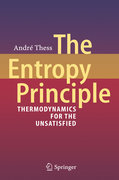
Entropy – the key concept of thermodynamics, clearly explained and carefully illustrated. This book presents an accurate definition of entropy in classicalthermodynamics which does not “put the cart before the horse” and is suitablefor basic and advanced university courses in thermodynamics. Entropy is the most important and at the same time the most difficult term of thermodynamics to understand. Many students are discontent with its classical definition sinceit is either based on “temperature” and “heat” which both cannot be accurately defined without entropy, or since it includes concepts such as “molecular disorder” which does not fit in a macroscopic theory. The physicists Elliott Lieb and Jakob Yngvason have recently developed a new formulation of thermodynamics which is free of these problems. The Lieb-Yngvason formulation of classicalthermodynamics is based on the concept of adiabatic accessibility and culminates in the entropy principle. The entropy principle represents the accurate mathematical formulation of the second law of thermodynamics. Temperature becomes a derived quantity whereas ”heat” is no longer needed. This book makes the Lieb-Yngvason theory accessible to students. The presentation is supplemented by seven illustrative examples which explain the application of entropy and theentropy principle in practical problems in science and engineering. Fascinating and entertaining Textbook - Companion for graduate students and researchersin engineering, physics and chemistry New view and understanding view of the entropy principle Based on the recently published Lieb-Yngvason Theory of Thermodynamics Author has taught thermodynamics and heta and mass transfer to students of engineering, chemistry, and physics for years Entropy- the key conceptof thermodynamics finally newly developed and understandable INDICE: Part1 Introduction.- Part 2 Adiabatic accessibility.-Part 3 Entropy.-Part 4 General conclusions.-Part 5 Specific applications.-Part6 Summary.- Part 7 References and further reading
- ISBN: 978-3-642-13348-0
- Editorial: Springer
- Encuadernacion: Cartoné
- Páginas: 150
- Fecha Publicación: 01/09/2010
- Nº Volúmenes: 1
- Idioma: Inglés
